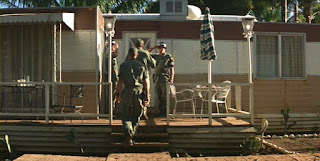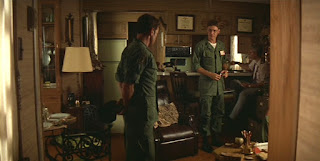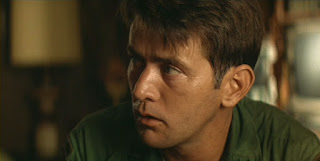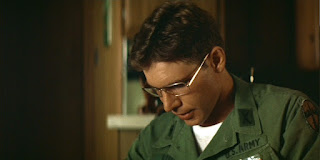Apocalypse Now lurches like a drunken bear between realism and surrealism. Of course, it originated with John Milius (maybe more so, than even Joseph Conrad). Told by one of his film instructors at USC that Conrad's "Heart of Darkness" had even challenged adaptation by Orson Welles, Milius made it his own personal mission to scale that mountain, bring down that beast, and conquer that wave by making his own adaptation, setting it during the Vietnam War and titling it (satirically) "Apocalypse Now"—after seeing hippies (whom he loathed) wearing pins that said "Nirvana Now." His treatment was part of the American Zoetrope package that Francis Ford Coppola sold to Warner Brothers, which was cancelled after the lackluster box-office of its first released film, George Lucas' THX-1138—the result of which led to Coppola taking "a job" to save the studio—a little gangster movie that Paramount was about to produce into the ground called The Godfather.
It's a quite often-told tale, that.
But, as austere as "Heart of Darkness" is, Milius' "Apocalypse Now" is flamboyant, taking the particular eccentricities of the Vietnam war—the drugs, the music, the racial mix, the mechanization vs. guerilla fighting, and blowing them up in vast neon gouts of napalm. It can be accused of reveling in the very things it's trying to abhor, but that's a symptom of so many "high concept" films.
Even this scene, which is, ostensibly, "by the book," has its flashes of weirdness—Marlon Brando's disembodied voice, the cut to a close-up of the shrimp entree just as he says the words "crawling, slithering" (enough to put you off your "surf and turf"), the whole vibe of a business luncheon while talking about a murder that "doesn't exist, and never will exist." The distaste that the uniforms feel in ordering the killing of one of their own (G.D. Spadlin's general has a general look of dyspepsia while Harrison's Ford's colonel seems to be fighting his own rising bile), while the civilian—who knows who HE is?—is as perfunctory as if he was a business man fulfilling an order.
And he's the only one who comes out and says, basically, "kill the colonel" (and with "extreme prejudice") in the veiled argot of non-accountability (as composed by Milius and Coppola).
But, it's those moments of Martin Sheen...looking directly at the camera...that truly haunt. By the time they occur, we're well acquainted with the askance sight-lines he has of the other characters in the scene, so when he's looking at us in those dark moments of dialogue ("Sometimes, the dark side overcomes
what Lincoln called the better
angels of our nature"), what is he looking at? Is he looking for answers? Is he looking for approval or acknowledgment (we are, after all, the recipient of his inner-most thoughts)? Is he looking to let us know he's in a trap? Is he looking into his possible future of the choices he'll be forced to make (there IS a lot of fore-shadowing in this movie, with cross-faded images of idols and such)?
Maybe it's the only place he can look in a room full of implied threats and unspoken deadly intent...and feel safe? Feel like Himself?
It's just another one of those mysteries that flit in and out of the Big Ideas and Big Set-pieces like shrapnel and chaos trying to be contained...and never can be.
Also, it should be noted with regret that Eleanor Coppola died Friday—she accompanied her husband, with their family, on the arduous journey to make Apocalypse Now, where she filmed extensive back-stage material, which was incorporated into the documentary Hearts of Darkness: A Filmmaker's Apocalypse (which I've embedded below, but Lord knows how long it will stay available), one of the best documentaries about film-making, obsession, and might even be closer in spirit to the themes of Joseph Conrad's source material than previous adaptations. Her book on the experience, "Notes," is an amazing read.
Ci mancherà moltissimo
The Set-Up: Captain Benjamin L. Willard (Martin Sheen) is "still" in Vietnam. He'd done his tour and returned home, got divorced and re-enlisted. An Army assassin with Special Forces, he has been languishing in a Saigon hotel, drinking, smoking, "getting softer" (in his words) when he is recruited for a mission quite unlike any other in his known experience. He has been called to meet General R. Corman (G.D. Spradlin), Colonel Lucas (Harrison Ford), and a civilian he does not know (Jerry Ziesmer)
Action.
EXT. MILITARY COMPOUND - DAY
A darkly painted Huey lands in a guarded military compound
somewhere in Nah Trang. The two enlisted men jump out of
the helicopter, leading Willard, who seems in much better
shape. As he gets out he sees a platoon of new men drilling
in the hot hazy sun. They are clean and pale.
WILLARD (V.O.)
Weeks away and hundreds
of miles up river that snaked
through the war like a circuit
cable...plugged straight into Kurtz.
He follows the escort across the fields as the platoon
drills.
WILLARD (V.O.)
It was no accident that I got to
be the caretaker of Colonel Walter
E. Kurtz's memory,
WILLARD (V.O.)
...any more that
being back in Saigon was an
accident.
WILLARD (V.O.) There was no way to tell his story without telling my own.
WILLARD (V.O.) There was no way to tell his story without telling my own.
They approach a civilian-type luxury trailer. It is
surrounded by concertina wire, and its windows have grenade
protection, but it still seems out of place in this austere
military base.
CLOSER ON WILLARD
He stands before the door for a moment, as the M.P.s
guarding the trailer check his papers.
INT. TRAILER - DAY
Cool and comfortable, furnished like home. Pictures on
the walls, certificates, photos of Presidents Kennedy,
Johnson and Nixon and other mementos decorating the room.
A small table is covered with linen and place settings for
three.
Willard enters.
WILLARD Captain Willard reporting, sir.
WILLARD (V.O.) then so is mine.
WILLARD
Thank you, sir.
COLONEL
Stand at ease.
Willard notices somebody O.S. and reacts.
The General crosses over to a cabinet and picks up a pack
of cigarettes, as the CAMERA REVEALS a CIVILIAN; probably
with the Department of Defense, sitting at the bar, and a
GENERAL sitting on a sofa.
The colonel turns and offers Willard a cigarette from the
pack.
WILLARD
No thank you, sir.
WILLARD
No, sir.
Willard gets up and moves towards the dining table with
the general and the civilian.
They sit down.
GENERAL
I noticed that you have a bad hand
there. Are you wounded?
WILLARD
Had a little fishing accident on R
and R, sir.
The food is being passed around.
GENERAL
Captain, I don't know how you feel
about this shrimp, but if you eat
it, you'll never have...
The colonel, who is not eating with them, walks to the
table, holding a small photo.
He shows the photo to Willard.
INSERT THE PHOTO
It's an eight-by-ten black-and-white portrait of an army
officer wearing a beret.
COLONEL
Jesus...
GENERAL
(to Willard)
Listen to it carefully, Captain.
MALE VOICE (ON TAPE) (V.O.)
"October 9, 04:30 hours, Sector
Peter, Victor, King."
All the men, including Willard, listen in wonder.
KURTZ (ON TAPE) (V.O.)
"I watched...
MALE VOICE (ON TAPE) (V.O.)
"Transmission 11, received '68,
December 30, 05:00 hours, Sector
King, Zulu, King".
KURTZ (ON TAPE) (V.O.)
"But we must kill them. We must
incinerate...
KURTZ (ON TAPE) And
they call me an assassin. What do
you call it, when the assassins
accuse the assassin?
COLONEL
...Montagnard army of his,
that worship the man like a god,
and...
GENERAL
...practical military necessity.
But out there with these natives,
it must be a temptation to...
COLONEL
follow it, learn what you
can along the way. When you find
COLONEL
the colonel, infiltrate his team
by...
GENERAL
He's out there operating without
any decent restraint, totally beyond
the pale of any acceptable...
COLONEL
You understand, Captain, that this
mission does not exist, COLONEL
...nor will
it ever exist.
Pictures by Vittorio Storaro and Francis Ford Coppola
Apocalypse Now is available on DVD and Blu-Ray from Paramount Home Entertainment.


















































































































































































No comments:
Post a Comment